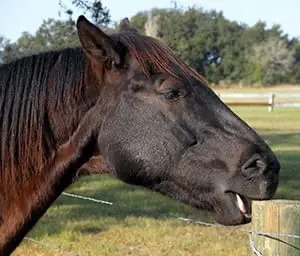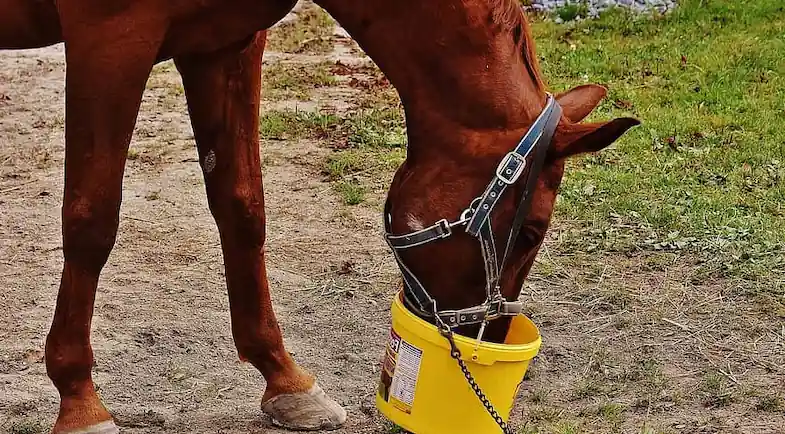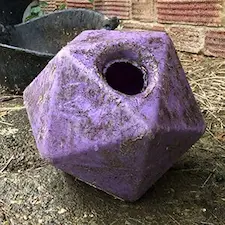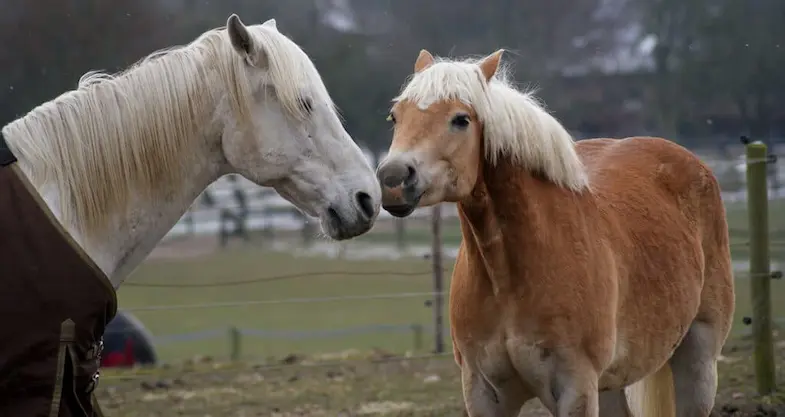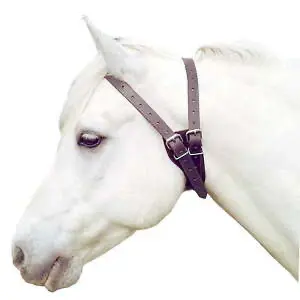Windsucking is probably one of the most misunderstood equine conditions out there, we all know that it’s a behavioral habit but many people will argue over whether it’s a vice or just a harmless annoyance, while others claim to have the cure. The problem is that if your horse is a windsucker, or you’re thinking about buying one that does, all of this isn’t going to do much to help you which is why I wanted to write this article, not to tell you what to do but to simply give you the facts about the condition.
What is windsucking?
Windsucking is when a horse arches his neck, opens his mouth, and swallows air, often making a loud gulping sound at the same time. There can be a number of reasons and causes for it and in a lot of cases, it’s nothing more than an annoying sound. In more severe cases though it can lead to a loss of condition as well as issues with a horse’s digestive system. This is one of the main reasons why windsucking is classed as a declarable vice, meaning a seller has to inform a potential buyer of the condition.
What’s the difference between cribbing and windsucking?
While cribbing and windsucking are very similar behavioral conditions, contrary to popular misconception, they aren’t actually the same thing. Cribbing involves a horse ‘biting’ (or resting his top teeth) on a stationary object, such as a fence post or stable door. He’ll then use the purchase he has on that to arch his neck and gulp the air. Horses that windsuck won’t bite onto anything, they’ll just arch their neck and gulp wherever they are.
While they are both different conditions horses that windsuck can learn to crib bite and vice versa, horses that crib bite can learn to windsuck, especially if you remove their ability to bite onto anything. The same can be said for horses that chew wood.
What causes a horse to windsuck?
There are a number of factors that can contribute to windsucking and in some cases be the trigger that causes it to start. Unlike some other vices though (such as weaving) there’s little evidence to suggest that windsucking is a learned behavior or that some horses are predispositioned to it. Instead, there is likely to be a single trigger:
Stress
It doesn’t matter what the cause of a horse’s stress is it can still be a trigger for windsucking as well as other vices. When they start to windsuck endorphins (often referred to as feel-good hormones) are released which helps to reduce the horse’s stress levels, sadly though this reinforces the behavior in the horse’s mind, therefore, making it more likely the horse will continue to do it.
Boredom
Along with stress, boredom (regardless of whether it’s caused by stall rest or something else) is one of the biggest factors in a horse windsucking. Horses are herd animals that spend a lot of their time grazing so when they’re stabled away from their friends and with little access to grazing they can get very bored. This boredom often leads to stress and depression which as mentioned before often leads to behavior conditions developing. This is why it’s crucial to keep your horse occupied if he’s on stall rest.
If your horse is windsucking because he’s on stall rest or because he’s stalled for long periods of time then you should check this article out on preventing boredom in horses that are stalled for all or most of the day.
Diet
There’s plenty of evidence to suggest that a horse’s diet can play a large role in the development of a wide range of conditions, including windsucking. While horses can easily digest grain they can have trouble if they’re digesting a lot without an appropriate ration of forage, especially if they have a high grain diet from a young age (shortly after weaning). Too much grain can also increase a horse’s susceptibility to ulcers which itself can be a trigger for windsucking.
This article explains the different types of food as well as what you should be feeding your horse (and when).
Pain
Particularly dental pain or pain caused by ulcers can be a trigger for windsucking because, as an involuntary movement, a horse will almost wince with pain. Rather similar to when we take a deep breath in before grimacing in pain, a horse will literally grasp at the air to alleviate the pain. This movement often eases the pain, albeit temporarily, so the horse continues which therefore leads to a habit-forming.
Anticipation
While it’s not so common horses can start to windsuck when they get excited about something such as being turned out, fed, or even when you turn up to visit them. Some horses will start kicking their stall, pawing the ground, or whinnying when they’re anticipating something they’re excited about while others will start windsucking.
Are some horses more prone to windsucking?
The most common cause of windsucking is lifestyle-related, whether its stress, boredom, diet, or something else, but that said performance horses that are regularly stabled for long periods of time and have high grain diets are more susceptible, as are those horses that are kept away from other horses (or other companions) a lot. There are also some breeds that are more likely to windsuck, breeds such as the Thoroughbred, Arabian, and Quarter Horse.
Can you stop a horse from windsucking?
There’s no quick (or magic) fix for stopping a horse from windsucking but the first thing you need to do is address the cause, after all, if you stop your horse from windsucking but don’t eradicate the reason why he started it’ll only be a matter of time before he starts again. Some treatments will be specific to the cause (such as ulcers for example) but there are some steps that you can take to treat the cause:
Regular deworming
Keeping your horse free from worms (or at least keeping the count low) will help to prevent gastrointestinal problems such as colic and ulcers which can be a trigger for windsucking.
Not sure when to deworm your horse? Check out this article on how to tell if your horse needs worming.
Reduce stable time
Horses that are stabled for prolonged periods of time can get very bored and stressed. If you have to keep your horse stabled, try and reduce his stress as much as possible, and keep occupied. You can use toys and roller feeders to keep your horse stimulated and reduce his boredom while things such as a Perspex mirror or a lavender spray can help to reduce his stress.
Good quality grazing
We all know the importance of good quality grazing but if you live in a sandy area this isn’t going to be possible. In this case, you’ll need to restrict how much grazing your horse has, but you can also feed him hay in a non-sandy area. If you live in a sandy area though you may find this article on how to feed a horse without pasture helpful.
Reduce concentrates
You should always feed your horse according to his age and workload so if he has a light workload he won’t need much concentrate, whereas if he’s a performance horse on a high workload then he’ll need a higher amount of grain. Regardless of your horse’s workload, he should always have plenty of good quality forage, the fiber in this will help him to digest his food properly.
Not sure what you should be feeding your horse? What and how much food your horse needs.
Make changes slowly
You might not think your horse would mind if you changed his food or started turning him out with a different group of horses but, while he may be happy with the change, it can cause a great deal of stress if you do any too quickly. Instead don’t rush any changes, if, for example, you’re changing your horse’s feed introduce it to his food over a period of a few weeks.
Avoid loneliness
Horses are sociable herd animals that don’t cope very well with being on their own. In an ideal world, we’d all keep our horses with other horses but sadly sometimes it’s not always possible. If you’re not able to provide your horse with at least one horsey companion you should think about another animal instead, goats, sheep, and chickens can all make good alternatives. If your horse is on his own and you’re looking for other ways to reduce his loneliness, this article on keeping a horse on its own will help.
In most cases, once you’ve dealt with the cause the windsucking will stop, although there are times when the horse will continue. This is because windsucking releases endorphins that make your horse feel happy, therefore he may continue.
What are the implications of a horse windsucking?
Until recently it was thought that, because the horse swallows the air and it enters their digestive system it caused ulcers and in some cases colic, but research has shown that more often than not a horse doesn’t actually inhale a lot of air. That said though it can lead to one particular type of colic, known as epiploic foramen colic. This is where part of the small intestine becomes trapped in the epiploic foramen (a small opening in the upper abdomen near the liver) and then becomes starved of blood. This part of the small intestine will then die and need to be removed to prevent toxins from being released into the horse’s bloodstream.
Should I use a collar to stop my horse windsucking?
Everybody has their own opinion on windsucking collars (sometimes called anti-cribbing collars) and whether or not they work. Some people swear blind they work while others see them as instruments of torture but the truth is obviously somewhere between the two.
If they’re used properly there’s no doubt they can work, the problem is that if they’re poorly fitted they can do the horse more harm than good. Then of course there’s the possibility that as soon as you remove the collar the horse starts windsucking again.
In my opinion, for what it’s worth, I don’t like them and would never use one. I think that they do have their purpose but if the horse isn’t suffering because as a result of windsucking it doesn’t matter.
Can surgery stop my horse from windsucking?
There is a surgical procedure, known as a modified Forrsell’s operation, that involves sectioning part of a branch of the accessory nerve as well as the muscles that the horse uses to arch his neck. The operation has a success rate of between 60-80% so should only be considered if your horse is directly suffering from windsucking and you’re dealt with every possible cause.
Should you try and stop a horse windsucking?
Once you’ve addressed the cause your horse may continue to windsuck but that doesn’t mean you should stop him doing it. After all, in most cases, it’s not doing him any harm so why would you want to stop it? It’s also worth noting that if you try and stop your horse you could end up stressing him and therefore making him more likely to windsuck.
Instead isn’t it better to let your horse be happy?
further reading
- Are horses meant to eat mud?
- Why do horses weave?
- What does it mean when a horse trips?
- Do horses suffer from fleas?
- Dealing with arthritis in horses
- The facts about equine influenza
- Strangles in horses explained
- Protecting your horse from sunburn
- How to keep mosquitoes away
- Equine Cushing’s Disease explained
I hope you found this article helpful. If you did I’d be grateful if you could share it please as it would really help me.
Recommended products
Over the years I have tried hundreds of different horsey products, from various blankets and halters to different treats. Some I’ve loved, others I’ve hated but I thought I’d share with you my top all-time favorite products, the ones I never leave the yard without. I’ve included links to the products (which are in no particular order) that I really think are great.
- Horse Knots by Reference Ready – If you’re like me and enjoy pocket reference guides then you’ll love this knot tying guide. These handy cards can easily fit in your pocket or attach to the saddle for quick reference. They’re waterproof, durable and are color coded to make them easy to follow.
- Mane ’n Tail Detangler – Even if you never show your horse you’ll need to detangle his tail from time to time (and possibly his mane too) which is always a challenging chore! I’ve found that if I run a little bit of detangler through my horse’s tails every few days it stops them from getting matted up and makes combing them easy, even if they’re coated in mud. I don’t know if I should admit to this or not but it also works wonders on my hair.
- TAKEKIT Pro clippers – Over the years I’ve tried a lot of different clippers and while some were obviously better than others I found these to be by far the best. They are heavier than a lot of other clippers but for me, that’s a good thing, it makes them feel more sturdy and hardwearing. On top of that they have a range of speeds so are just as good for clipping your horse’s back as they are his face. I also like the fact that they come in a handy carry case but that’s not for everybody. The company that makes them is super good and incredibly helpful too, a real bonus these days. The only thing I wasn’t keen on was the fact that it doesn’t come with any oil, but that’s not a major problem as it’s not difficult to buy lubricant.
- Shire’s ball feeder – There are so many boredom buster toys out there but I like to use these every day, regardless of whether or not my horses are bored. I find that it helps to encourage my horses to problem solve by rewarding them with treats (or pieces of fruit) but it also mimics their natural grazing behavior which helps to keep them calm and de-stressed.
- Horse safe mirror – This is a strange one that many people are surprised about but I like to put horse safe mirrors in the trailers as well as in the quarantine stalls. It helps to prevent the feeling of isolation by giving the impression of other horses being around. Being herd animals horses can get extremely stressed when they feel that they’re on their own but with these stick-on mirrors, they believe that at least one other horse is with them.
- Rectal thermometer – I know this isn’t glamourous at all but it’s vital for your horse’s well-being to be able to check their temperature and a rectal thermometer is the easiest way of doing this which is why I’ve added it to the list.
Shopping lists
I’ve also put together a few shopping lists of essential items that I’ve found helpful over the years. I’ve broken the lists down into different categories rather than put everything in one massive list 😉

